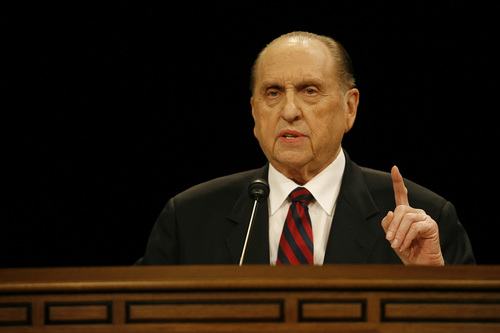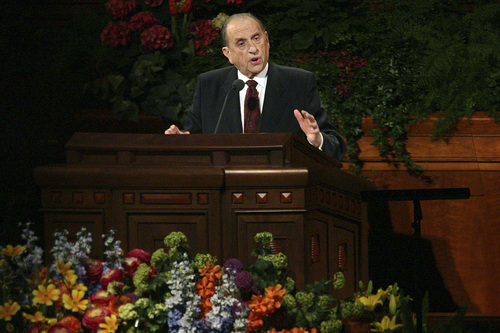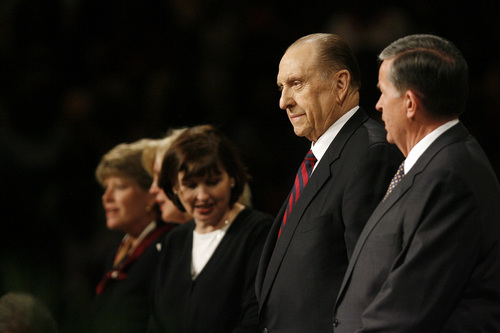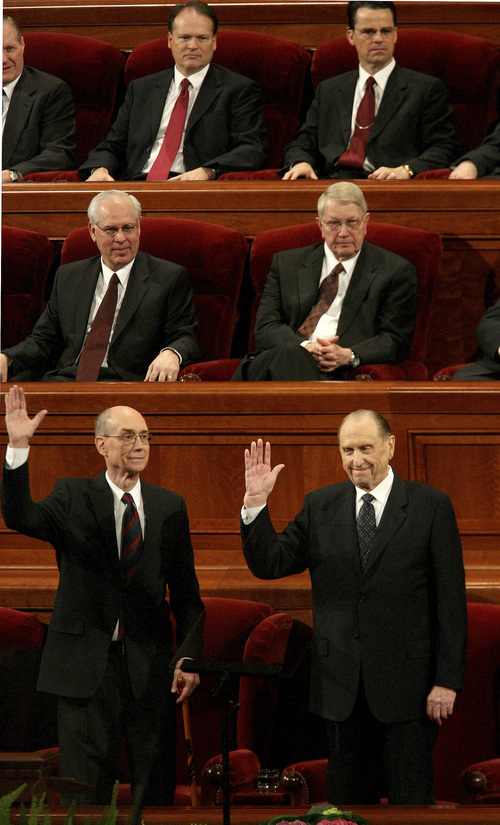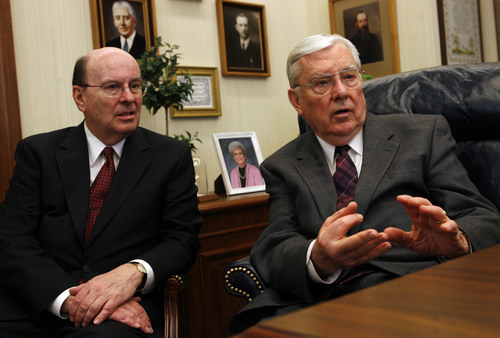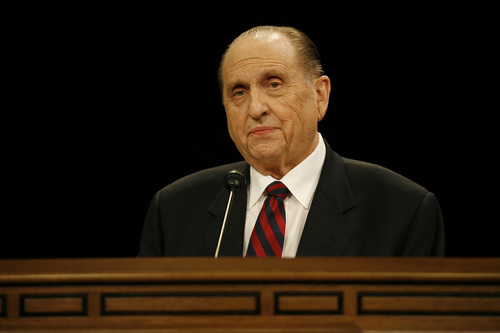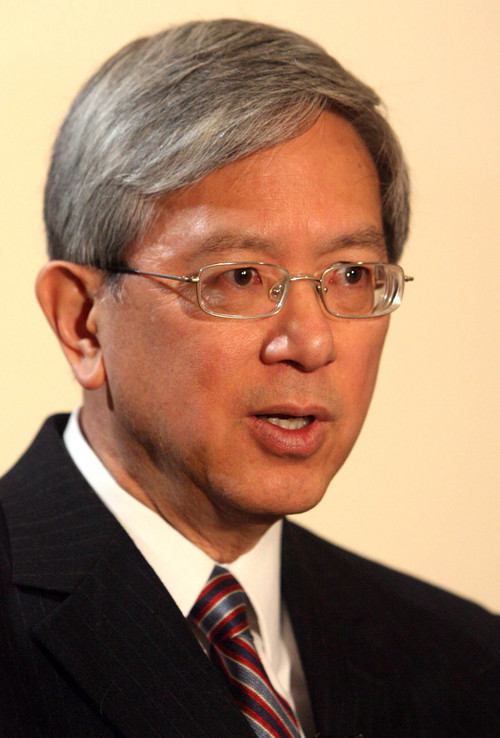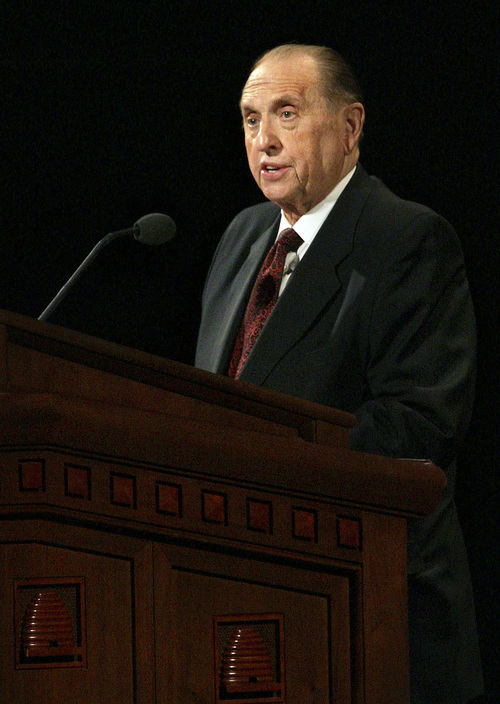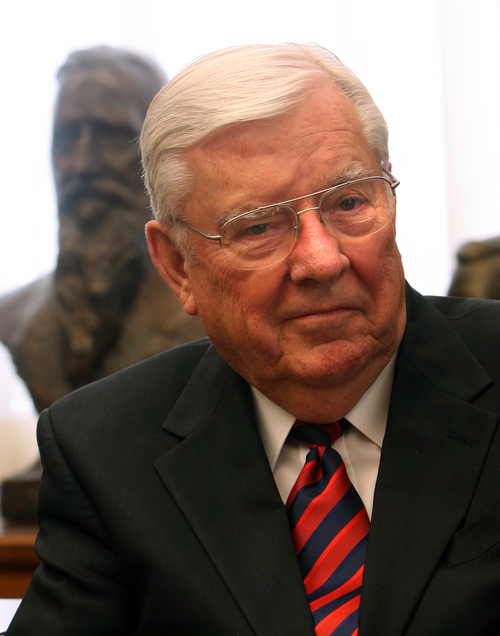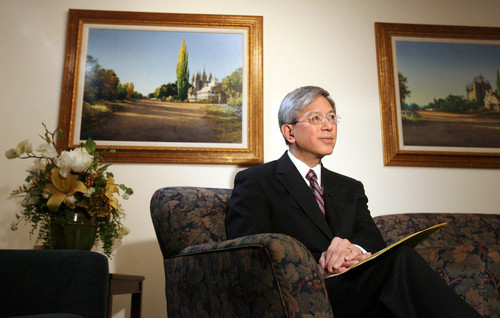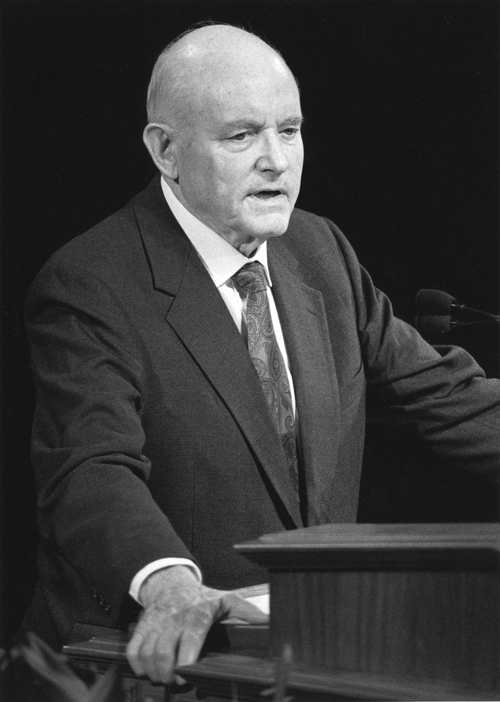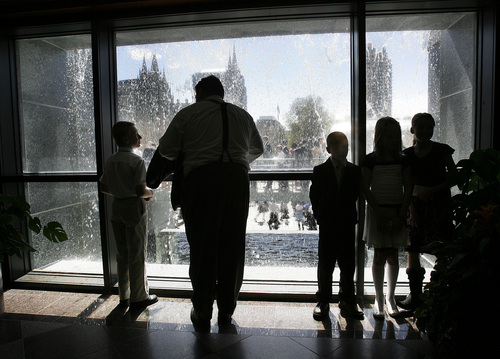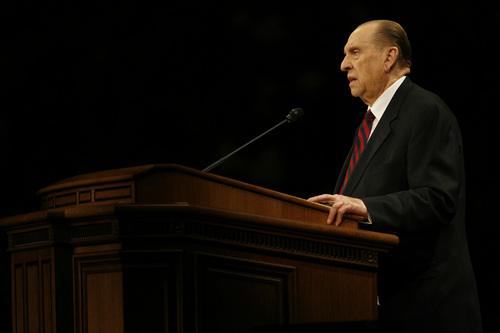This is an archived article that was published on sltrib.com in 2014, and information in the article may be outdated. It is provided only for personal research purposes and may not be reprinted.
Speeches given at semiannual Mormon General Conferences, whether streamed, beamed or broadcast from the Conference Center in downtown Salt Lake City, are viewed as authoritative.
They are posted on the faith's website, printed in its official magazine and reviewed by Latter-day Saints in their homes and at their chapels.
Some addresses build hope; others tear down myths. Some lament worldly vices; others celebrate heavenly virtues.
We asked several Mormons to tell us about a favorite conference sermon and why it impressed them.
Kristine Haglund, editor of Dialogue: A Journal of Mormon Thought
Jayne B. Malan's 1989 talk, "The Summer of the Lambs," remains the most moving and powerful statement of the great commission that I have ever heard. It is central to my understanding of the gospel and of the Savior. Through the years, I've read and listened to it many times and have been struck each time by another element of the sermon's force and truth. I think the power comes first from how vividly she describes her childhood experience, and how matter-of-fact and unsparing she is in acknowledging the loss and sorrow that haunt mortality. Feeding sheep is difficult and risky, even with the best intentions in the world; the stakes are high. And yet she honors the young people she's addressing as intelligent and respected partners in Christ's saving work, as capable and needed: "Your Heavenly Father knows you and cares about what you are doing. He wants you to fulfill your divine mission, then come home and bring your family and friends with you." Because she had described both the difficulty and the joy of her experience with her lambs as a young girl, I could believe her. When Malan, a counselor in the Young Women's presidency, repeated the Savior's command to "feed my lambs," I felt both that I could and that I must join her efforts. Malan's address was also the first conference talk I remember hearing from a woman — the actual first came from General Primary President Michaelene Grassli in 1988 — and her identifying herself with the great shepherd was an important moment for me. Of course, I had always known that I could and should try to emulate Christ, even though he was a man and I'm not, but it mattered deeply to me as a young woman to hear Christ's words in a woman's voice, and see a woman confidently identifying herself as an under-shepherd. When I read those words in the scriptures, I still hear them in her kind, earnest voice. And in that voice — a woman's voice — I hear the Savior's call to me.
Armand Mauss, retired LDS sociologist in Irvine, Calif.
A favorite of mine is from an earlier period, President Howard W. Hunter's October 1991 address, "The Gospel — A Global Faith."
It has recurred in my memory many times since Hunter gave it while he was still heading the Quorum of the Twelve Apostles. Hunter was unusually expansive in his love and appreciation for other peoples of the world, and his public messages often reflected that outlook. This address was given just after the Cold War had ended, and before the new wariness about the Muslim world had begun to preoccupy our nation. It was as though he was urging us to look outward for the good that could be found in other cultures besides our own.
"This is a message of life and love that strikes squarely against all stifling traditions based on race, language, economic or political standing, educational rank, or cultural background, for we are all of the same spiritual descent," Hunter said. "We have a divine pedigree; every person is a spiritual child of God."
The apostle alluded to Alma 29:8 in the Book of Mormon as he emphasized that a great many religious leaders in the world are inspired, and then quoted an earlier conference talk by Elder Orson F. Whitney: "[O]ther good and great men, not bearing the priesthood, but possessing profundity of thought, great wisdom, and a desire to uplift their fellows, have been sent by the Almighty into many nations, to give them, not the fullness of the gospel, but that portion of truth that they were able to receive."
Saren Loosli, founder of Power of Moms: A Gathering Place for Deliberate Mothers
My favorite talk is "Daughters of God" by Elder M. Russell Ballard in April 2008.
"There is no one perfect way to be a good mother. Each situation is unique. Each mother has different challenges, different skills and abilities, and certainly different children. The choice is different and unique for each mother and each family," Ballard said. "Many are able to be 'full-time moms,' at least during the most formative years of their children's lives, and many others would like to be. Some may have to work part or full time; some may work at home; some may divide their lives into periods of home and family and work. What matters is that a mother loves her children deeply and, in keeping with the devotion she has for God and her husband, prioritizes them above all else."
The apostle went on to say: "It is crucial to focus on our children for the short time we have them with us and to seek, with the help of the Lord, to teach them all we can before they leave our homes. This eternally important work falls to mothers and fathers as equal partners."
I love how Ballard talked directly to me and all the other young mothers out there who sometimes wonder if any of those grandpas up there on the podium at General Conference can possibly understand the hard stuff involved in mothering young children. It felt so good to be validated and to be reminded of things that I know in my heart but can never be reminded of too often — namely that joy in motherhood comes in moments, that we need to be careful not to overschedule ourselves and our families (and wind up rushing past those moments), that we need to prioritize our own personal development and interests, and that we can and should find individual inspiration from God as we strive to be the mothers we want and need to be. I also really appreciated that he offered concrete suggestions for how fathers, children and the church can better support and assist mothers in their important work.
I absolutely loved hearing Ballard share one of my all-time favorite quotes about motherhood by my favorite author, Anna Quindlen, who isn't generally quoted much in Mormon circles: "The biggest mistake I made [as a parent] is the one that most of us make. … I did not live in the moment enough. … I wish I had not been in such a hurry to get on to the next thing: dinner, bath, book, bed. I wish I had treasured the doing a little more and the getting it done a little less."
Steve Evans, Utah lawyer and founder of By Common Consent
One recent favorite is "Looking Back and Moving Forward" from the April 2008 conference. It was President Thomas S. Monson's first conference as leader of the church.
His predecessor, Gordon B. Hinckley, had left big shoes to fill — perhaps the biggest shoes of any prophet since Brigham Young in terms of social influence, time spent in a leadership capacity, national celebrity and popularity within the church.
I've loved hearing Monson's stories since I was a child, but I keenly felt Hinckley's absence and felt nervous as to how it was going to feel to have a different prophet at the helm. I was in the Conference Center as I heard Monson give this address, and it seemed to me that as he continued to speak, a spirit of confirmation came not just to me but to all those in attendance. He spoke the words, "Come back. We reach out to you in the pure love of Christ and express our desire to assist you and to welcome you into full fellowship. To those who are wounded in spirit or who are struggling and fearful, we say, 'Let us lift you and cheer you and calm your fears.' " As he did so, I felt assured that God continues to lead this church. I don't feel that Monson's leadership has been as favored in the public eye as Hinckley's, nor has it felt as dynamic and positive. Still, I feel my faith in this church affirmed. It is a good place to be.
Cherry Bushman Silver, a former General Relief Society board member and research historian who has spent years working on the diaries of Emmeline B. Wells
I nominate a talk by Elder Gerrit W. Gong, given in October 2010, titled "Temple Mirrors of Eternity: A Testimony of Family."
His talk was memorable to me because he conveyed a sense of known family back to the Tang dynasty, far beyond that which most of European ancestry can claim. He recounted his family story of conversion in a few words but underscored the subsequent impact on many lives. He used the metaphor of mirrors to urge human linkage and generational responsibility.
"Temple mirrors of eternity remind us that each human being has 'divine nature and destiny'; that 'sacred ordinances and covenants available in holy temples make it possible for individuals to return to the presence of God and for families to be united eternally,' " he said, "and that, growing together in love and faithfulness, we can give children roots and wings."
Finally, Gong spoke of the roles of Jesus Christ as they affect individual lives, not dodging the paradoxes but citing profound and poetic scriptures.
"Sometimes things go wrong even though we have done our very best. A lamb innocent and pure, our Savior weeps with and for us," he said. "When we always remember him, he can stand with us."
That left me feeling the impact as well as thinking about the range of issues Gong touched on.


